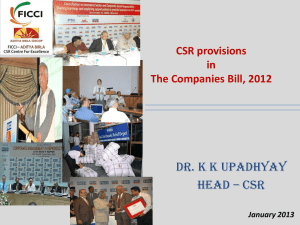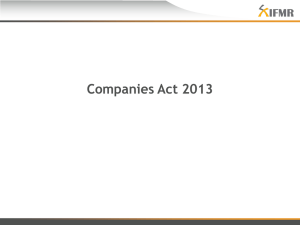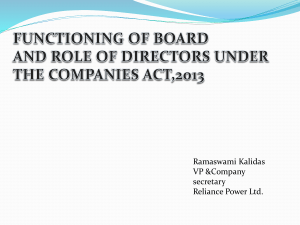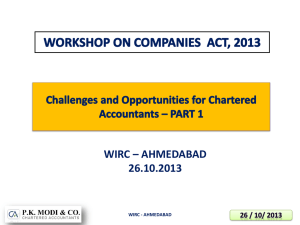Presentation on Companies Bill - Ajcon Global Services Limited
advertisement
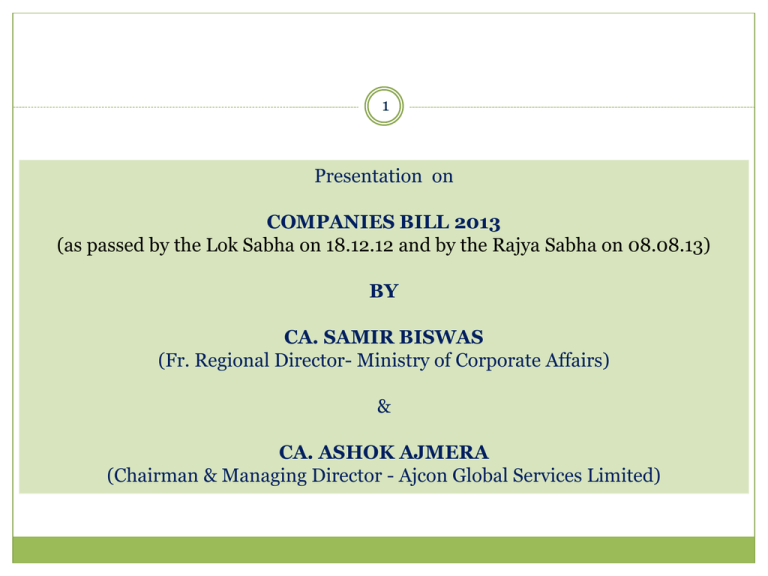
1 Presentation on COMPANIES BILL 2013 (as passed by the Lok Sabha on 18.12.12 and by the Rajya Sabha on 08.08.13) BY CA. SAMIR BISWAS (Fr. Regional Director- Ministry of Corporate Affairs) & CA. ASHOK AJMERA (Chairman & Managing Director - Ajcon Global Services Limited) 2 Table of Contents Sr. No. Topics Page Number 1 History/ Background 3 2 Salient Features 6 3 New Provisions Introduced 8 4 Provisions Amended 12 5 Provisions Cited in Companies Bill 2013 for Better Governance 16 6 Concepts and Amendments in the Companies Bill, 2013 19 7 Introduction of CSR Provisions in the Companies Bill 2013 22 8 Gist of the Companies Bill, 2013 – List of Chapters 24 9 Differences between Companies Act 1956 & Companies Bill 2013 28 10 How would the Companies Bill 2013 affect the Corporates 36 3 HISTORY/ BACKGROUND OF COMPANIES BILL 2013 HISTORY/ BACKGROUND 4 1. Government constitutes an Expert Committee on Company Law under the Chairmanship of Dr. J. J. Irani on 2nd December 2004 to advice on new Companies Bill. 2. The Committee submitted its report to the Government on 31st May 2005. 3. Companies Bill 2008 was introduced on 23rd October, 2008 in the Lok Sabha to replace existing Companies Act, 1956. 4. Dissolution of the 14th Lok Sabha, leads to lapse in Companies Bill, 2008 lapsed. 5. Ministry of Corporate Affairs introduces the Companies Bill, 2009 in the Lok Sabha on August 3, 2009. 6. Bill referred to the Standing Committee on Finance (SCF) of the parliament for examination in September 09, 2009. 7. Report of the SCF on Companies Bill introduced in the Lok Sabha on 31st August, 2010. HISTORY/ BACKGROUND 5 8. In view of amendments made by recommendation made by SCF and suggestions of Stakeholders the Companies Bill 2009 was withdrawn by the Central Government. 9. A fresh Companies Bill 2011 was introduced in Parliament on Wednesday, 14th December 2011. 10. The Companies Bill, 2011 was referred to the Standing Committee on Finance on 5th January, 2012 after an objection was raised against it in Parliament. 11. Based on the SCF’s recommendations, the Bill was amended and introduced as the Companies Bill 2012. 12. The Lok Sabha on 18th December, 2012 approved the Companies Bill 2012; but could not be placed in that session in the Rajya Sabha. 13. In the Current Session of the Parliament Rajya Sabha passes the Bill on 8th August 2013 14. Now the assent of the President of India and the Bill‘s publication in the Official Gazette will be necessary before the Bill becomes an Act 6 SALIENT FEATURES OF THE COMPANIES BILL 2013 SALIENT FEATURES OF THE COMPANIES BILL 2013 7 Salient Features COMPANIES ACT 1956 COMPANIES BILL 2013 13 Parts 29 Chapters 658 Sections 470 Clauses 15 Schedules 7 Schedules New Chapters included in Companies Bill 2013 Chapter Description Chapter Number Registered Valuers Chapter 17 Government Companies Chapter 23 Companies to Furnish Information or Statistics Chapter 25 Nidhis Chapter 26 National Company Law Tribunal & Appellate Tribunal Chapter 27 Special Courts Chapter 28 8 NEW PROVISIONS INTRODUCED IN COMPANIES BILL - 2013 New Provisions Introduced in Companies Bill- 2013 9 For the first time introduced the concept of One Person Company [Clause 2(62)]. Expert [Clause 2(38)]. Inclusive definition of Financial Statement [Clause 2(40)]. Entrenchment Provisions in Articles of Association (Clause 5). Public Offer and Private Placement deals with issue of securities by a public and a private company (Clause 23). Class Action Suits (Clause 37). E-governance in all company processes (Clause 120). Corporate Social Responsibility - 2% of average net profits of the previous three years (Clause 135). Mandatory Internal Audit for prescribed classes of companies (Clause 138). Mandatory Rotation of auditors for listed companies and other prescribed classes of companies after 1 terms of 5 consecutive years in case of individual auditor and after 2 terms of 5 consecutive years for audit firm (Clause 139) New Provisions Introduced in Companies Bill- 2013 10 5 year tenure for auditor appointed at AGM of company (other than Government Company/ Government controlled Company) instead of Annual Appointment/ Reappointment Limited Liability Partnership eligible to be appointed as Auditor of Company (Clause 141) Auditor not to render certain services (Clause 144) Independent Directors [Clause 149] 1/3rd of the total number of directors as independent directors listed public companies Inclusion of at least one woman director on board (Clause 149). Every company to have at least one director who has stayed in India for a total period of not less than one hundred and eighty-two days in the previous calendar year. (Clause149 (3)) Nomination and Remuneration committee [Clause 178(1)] Stakeholders relationship committee [Clause 178(5)] Key Managerial Personnel [Clause 2(51) and Clause 203] to include Manager or Managing Director (MD) or Chief Executive Officer (CEO), Whole Time Director, Chief Financial Officer (CFO) and Company Secretary (CS). New Provisions Introduced in Companies Bill- 2013 11 Insider Trading of Securities Prohibited (Clause 195) Statutory Status to the Serious Fraud Investigation Office (SFIO) (Clause 211) Specific framework for Merger and Acquisitions of companies. Single forum for approval of mergers and acquisitions (Clause 233) Merger or Amalgamation of a Company with Foreign Company (Clause 234) Protection to Minority Shareholders, Class Action Suits for Prevention of Oppression and Mismanagement [Clause 245] Registered Valuers (Clause 247) Interim Administrators or Company Administrators [Clause 259] Mediation and Conciliation Panel (Clause 442) Punishment for Fraud (Clause 447) 12 PROVISIONS AMENDED Provisions Amended 13 Financial Year in relation to any company or body corporate, means the period ending on the 31st day of March every year (Clause 2(41)) Limit on maximum number of members of private company increased to 200 from 50 (Clause 2(68)(ii)) Matter to be stated in Prospectus (Clause 26) – Unlike Companies Act, 1956 which presently require compliance of schedule II/III/IV as the case may be. Allotment of Securities by Company (Clause 39) – the scope has been widened from shares to Securities defined under Clause 2(81). According to Clause 2(81) Securities‘ means the securities as defined in Clause (h) of Section 2 of the Securities Contracts (Regulation) Act, 1956 (Securities broadly includes shares, debentures , bonds, scrips or any other marketable securities including derivatives. Further issues of share capital (Clause 62) – No restriction on the nature of companies to which this clause is applicable and for the purposes of further issue of capital such shares shall also be offer to employees under a scheme of employees stock option and conversion of debenture/loan into shares in public interest. Provisions Amended 14 National Advisory Committee on Accounting Standards (NACAS) renamed as National Financial Reporting Authority (NFRA) and providing wide powers and responsibilities (Clause 132) Annual Ratification of Appointment of Auditors in Annual General Meeting [Clause 139 (1)] Mandatory Compliance with Auditing Standards in addition to Accounting Standard (Clause 143) Audit Committee with extensive powers [Clause 177] Punishment for personating for acquisition etc. of securities (Clause 38) – is punishable under Section 447 under punishment for fraud. Automatic re-appointment of existing auditor (without resolution) at AGM where no auditor is appointed / Re-appointed at AGM. The Central Government‘s role to appoint a person to fill the vacancy has been removed. Company Liquidators [Clause 275] in addition to appointment of Company liquidator under certain circumstances. Provisions Amended 15 Under clause 186 (Loan and Investment by Company), except for the provision pertaining to making investment through not more than two layers of investment companies dealt with under sub clause 1, no other provision of Clause 186 shall be applicable to a loan made, guarantee given or security provided by a banking company, insurance company, housing finance company in the ordinary course of business and to any acquisition made by a non banking finance company (NBFC) registered under Chapter IIIB of the Reserve Bank of India Act, 1934 and whose principal business is acquisition of securities and to acquisition made by a company whose principal business is the acquisition of securities and to any acquisition of shares allotted in pursuance of clause (a) of sub section (1) of clause 62. Technical members of the National Company Law Tribunal or the Appellate Tribunal [Clause 409(3)] Relaxation of restriction limiting the number of persons in Association or Partnerships etc. at a time to a maximum of 100 [Clause 464] No ceiling on number of members/partners as to associations or partnerships formed by professionals regulated by special acts. [Clause 464]. 16 PROVISIONS CITED IN COMPANIES BILL-2013 FOR BETTER GOVERNANCE Provisions Cited in Companies Bill-2013 for Better Governance 17 New Provisions for Better Governance: •Requirement to constitute Remuneration and Nomination Committee and Stakeholders. •Grievances Committee. •Granting of More powers to Audit Committee. •Specific clause pertaining to duties of directors. •Mode of appointment of Independent Directors and their tenure. •Code of Conduct for Independent Directors. •Rotation of Auditors and restriction on Auditor's for providing non-audit services. •Enhancement of liability of Auditors. Provisions Cited in Companies Bill-2013 for Better Governance 18 New Provisions for Better Governance: •Disclosure and approval of Related parties Transactions. •Mandatory Auditing Standards. •Enabling Shareholders Associations / Group of Shareholders for taking class action its & reimbursement of the expenses out of Investor Education and Protection Fund. •Constitution of National Financial Reporting Authority, an independent body to take action against the Auditors in case of professional misconduct. •Requirement to spend on CSR activities. 19 CONCEPTS & AMENDMENTS IN THE COMPANIES BILL, 2013 Concepts and Amendments in the Companies Bill, 2013 20 The Companies Bill, 2013 applies to the whole of India and is also applicable to certain companies or bodies corporate governed by Special Acts Substantive law is in the Bill & procedural aspects shall be in form of rules to be prescribed. The Government of India has the power to notify different provisions of the Act at any point of time. The maximum number of members, which a Private Company can have, is increased from 50, as provided in the Companies Act 1956 (and Companies Bill 2009), to 200 (except in case of One Person Company). The definition of Public Company provides that a private subsidiary of a public company shall be deemed to be a public company even though the subsidiary may continue to retain the status of a private company in the Articles. Concepts and Amendments in the Companies Bill, 2013 21 The scope of officer who is in default has been broadened. The share transfer agents, registrars and merchant bankers to the issue or transfer related to issue of shares & Chief Financial Officer are also brought under its ambit. Directors who are aware of the default by way of participation in board meeting or receiving the minutes without objecting to the same will also be included in this category even if company has Managing Director / Whole Time Director / other Key Managerial Personnel's. Defaults of procedural nature to be penalized by levy of monetary penalties by adjudicating officers not below level of Registrar. Appeals against such orders will lie with designated higher authorities. 22 INTRODUCTION OF CSR PROVISIONS IN COMPANIES BILL 2013 Introduction of CSR Provisions in the Companies Bill 2013 23 Corporate Social Responsibility (CSR) Obligations have been introduced under Clause 135 of the Companies Bill, 2013. Under the new law, the CSR spending would be the responsibility of companies. The Bill seeks to make CSR spending compulsory for companies that meet certain criteria. The companies will have to mandatorily spend 2% of their average net profit for CSR activities. CSR Provisions in Companies Bill 2013: Every company having; 1. Net worth of Rs. 500 Crore or more, or 2. Turnover of Rs. 1000 Crore or more or 3. Net profit of Rs. 5 Crore or more During any financial year shall constitute a Corporate Social Responsibility Committee of the Board consisting of 3 or more directors, out of which at least 1 director shall be an independent director. The Board's report under clause 134(3) shall disclose the composition of the Corporate Social Responsibility Committee. 24 GIST OF THE COMPANIES BILL, 2013 LIST OF CHAPTERS Gist of The Companies Bill, 2013 – List of Chapters 25 Sr No Chapter Title 1 Chapter I Preliminary 2 Chapter II Incorporation of Company and Matters Incidental Thereto Prospectus and Allotment of Securities 3 Chapter III Part I: Public Offer Part II: Private Placement 4 Chapter IV Share Capital and Debentures 5 Chapter V Acceptance of Deposits by Companies 6 Chapter VI Registration of Charges 7 Chapter VII Management and Administration 8 Chapter VIII Declaration and Payment of Dividend 9 Chapter IX Accounts of Companies 10 Chapter X Audit and Auditors Gist of The Companies Bill, 2013 – List of Chapters 26 Sr No Chapter Title 11 Chapter XI Appointment and Qualifications of Directors 12 Chapter XII Meeting of Board and Its Powers 13 Chapter XIII Appointment and Remuneration of Managerial Personnel 14 Chapter XIV Inspection, Inquiry and Investigation 15 Chapter XV Compromises, Arrangements and Amalgamations 16 Chapter XVI Prevention of Oppression and Mismanagement 17 Chapter XVII Registered Valuers 18 Chapter XVIII Removal of Names of Companies from the Registrar of Companies 19 Chapter XIX Revival and Rehabilitation of Sick Companies Winding Up Part I: Winding up by the Tribunal 20 Chapter XX Part II: Voluntary Winding up Part III: Provisions applicable to every mode of Winding up Part IV: Official Liquidators Gist of The Companies Bill, 2013 – List of Chapters 27 Sr No Chapter Title 21 Chapter XXI 22 Chapter XXII Companies Incorporated Outside India 23 Chapter XXIII Government Companies 24 Chapter XXIV Registration Offices and Fees 25 Chapter XXV Companies to Furnish Information or Statistics 26 Chapter XXVI Nidhis 27 Chapter XXVII National Company Law Tribunal and Appellate Tribunal 28 Chapter XXVIII Special Courts 29 Chapter XXIX Miscellaneous Part 1- Companies Authorised to Register Under This Act & Part 2- Winding up of Unregistered Companies 28 DIFFERENCES BETWEEN COMPANIES ACT 1956 & COMPANIES BILL 2013 Differences between Companies Act 1956 & Companies Bill-2013 29 Particulars Companies Act 1956 Companies Bill 2013 Dividends Transfer to Reserves No Dividend can be declared for any F.Y. out of the profits of the Company for that F.Y., except after the transfer to the reserves such portion of profits of the Company for that F.Y., not exceeding 10% of its profits. A company to transfer voluntarily a portion of its profits to the reserves as considered appropriate, before declaration of any dividend. Mandatory transfer to reserves done away. Declaration of Dividend in case of inadequate profits In case of inadequacy or absence of profits in any F.Y., the company can declare dividend out of the reserves only after complying with the Companies (Declaration of Dividend out of Reserves) Rules,1975, wherein the maximum rate of dividend is prescribed as 10%. In case of inadequacy or absence of profits in any F.Y., the company can declare dividend out of the accumulated profits transferred to reserves in accordance with the rules to be prescribed. Restrictions on Declaration of Dividend/ Interim Dividend No declarations are provided for declaring Dividend. Interim Dividend may be declared out of the surplus in the Profit & Loss A/c as well as profits of the financial year in which dividend is sought to be declared. In case company has incurred loss up to the preceding quarter of the current financial year, then interim dividend shall not be declared at a rate higher than the average dividends declared by the company during the immediately 3 preceding financial years. interim Failure to comply with provisions relating to acceptance and repayment of deposits will bar the company to declare any dividend during the period of non-compliance. Differences between Companies Act 1956 & Companies Bill-2013 30 Particulars Companies Act 1956 Companies Bill 2013 HOLDING-SUBSDIARY COMPANY Restriction on Step down Subsidiary No Restriction Class or classes of holding companies as may be prescribed shall not have layers of subsidiaries beyond such numbers as may be prescribed. CONSOLIDATION OF FINANCIAL STATEMENTS Consolidation of Financial Statements No existing provisions In case a company has one or more subsidiaries, it shall in addition to stand-alone financials, prepare a consolidated financial statement of all the subsidiaries in the same form and manner as that of its own which shall also be laid before the AGM of the Company. Further, such companies shall also attach along with its financial statement, a separate statement containing the salient features of the financial statement of its subsidiaries in such form as may be prescribed. For the purpose of above, subsidiary shall include associate company and joint venture. REGISTERED VALUER Exemptions No provisions provided for Registered Valuer. Where valuation is required to be made under the Act, in respect of any property, stocks, shares, debentures, securities, goodwill or other assets or net worth of a company or its liabilities, such valuation shall be done by a registered valuer. Differences between Companies Act 1956 & Companies Bill-2013 31 Particulars Companies Act 1956 Companies Bill 2013 Exemption from granting Inter-corporate loan, guarantee, security and investments Exemptions Any loan made, guarantee given or any security provided or any investment made byBanking co., or Insurance co., or Housing finance Co., or Company established with the object of financing industrial enterprises or providing infrastructural facilities, or Any company whose principal business was acquisition of shares, stocks, debentures or other securities; A private co., unless it is a subsidiary co.; Holding Co. to its WOS Any investment made in shares allotted pursuant to further issue of capital Any loan, guarantee or security provided byBanking co.; or insurance co.; or housing finance co., in ordinary course of their business; Co. engaged in the business of financing of companies or of providing infrastructural facilities Investment and lending by NBFC whose principal business is acquisition of securities Acquisition by companies having principal business of acquisition of securities Acquisition of shares pursuant to further issue of capital Differences between Companies Act 1956 & Companies Bill-2013 32 Particulars Companies Act 1956 Companies Bill 2013 RELATED PARTY TRANSACTIONS Scope Section Approval required of A co. cannot enter into the contracts relating to• Sale, purchase or supply of any goods or materials; • Sale, purchase or supply of any services; • Underwriting the subscription of any shares, debentures of a co. A co. cannot enter into contracts relating to• Sale, purchase or supply of any goods or materials; • Selling or disposing of ,or buying, property of any kind; • Leasing of property of any kind; • Availing or rendering of any services; • Appointment of any agents for purchase or sale of goods, materials, services or property; • Appointment to any office or place of profit in the company, its subsidiary co. or associate co.; • Underwriting the subscription of any securities or derivatives thereof , of the co. • • • Prior consent of the BoD by resolution passed at Board meeting Prior approval of Regional Director, in case the paidup capital of company is exceeding Rs.1 crore. • Prior consent of the BoD by resolution passed at Board meeting Prior approval of Shareholders, in case the paid-up capital of co. or transaction amount exceeds prescribed limit. Differences between Companies Act 1956 & Companies Bill-2013 33 Particulars Companies Act 1956 Companies Bill 2013 RELATED PARTY TRANSACTIONS Specified persons with whom contracts are covered • • • • Director of the Co. Relative of such Director A firm in which such Director or Relative is a partner Any other partner of such firm in which Director or Relative is a partner Private co. in which such director is a director or member Related Party-Director or his relative • KMP or his relative • Firm, in which a director, manager or his relative is a partner • Private Co. in which a director or manager is a member or director • Public Co. in which a director or manager is a Director or holds along with his relatives, more than 2% of its paid-up share capital • Any body corporate whose BoD, MD, or manager is accustomed to act in accordance with the advice, directions or instructions of a director or manager • Any person under whose advice, directions or instructions, a director or manager is accustomed to act • Any Co. which is-a holding, subsidiary or associate Co. of such Co. -a subsidiary of a holding co. to which it is also a subsidiary .such other persons as may be prescribed. Purchase/Sale of goods and materials for cash at prevailing market price. Purchase/Sale of goods and materials or services, the cost of which does not exceed Rs.5000/- in any year during the period of contract. Any transaction of banking/insurance company in the ordinary course of such company. Any transaction entered by company in its ordinary course of business other than transactions which are not an arm’s length basis. • Exemptions Differences between Companies Act 1956 & Companies Bill-2013 34 Particulars Companies Act 1956 Companies Bill 2013 LOAN TO DIRECTORS Applicability of Section Public Companies Public & Private Companies Scope of Section No Public Co. shall directly or indirectly make any loan or give any guarantee or provide any security to its directors and other certain specified persons, except with the approval of CG. No Public Co. shall directly or indirectly make any loan including book debt or give any guarantee or provide any security to its directors or to any other persons in whom the director is interested. Exemptions This section does not apply toPrivate Cos. Holding to its subsidiary Banking Cos This section does not apply to• Loan to MD/WTD -as a part of contract of services extended to all its employees -pursuant to scheme approved by members by special resolution. • A Co. which in the ordinary course of its business provides loan, guarantee or security for due repayment of any loan and charges interest thereon being not less than bank rate declared by RBI. Differences between Companies Act 1956 & Companies Bill-2013 35 Particulars Companies Act 1956 Companies Bill 2013 WINDING UP/ STRIKE OFF Grounds for Winding up reduced Criteria for winding-up provided by NCLTIf the Co. has, by special resolution, resolved that the co. be wound up. Certain criteria for winding-up by NCLT deleted like minimum number of members falling below prescribed limit, noncommencement of business for 1 yr, etc. If the co. is unable to pay its debt Additional ground provided: NCLT is of the opinion that•The affairs of the co. have been conducted in a fraudulent manner •Co. was formed for fraudulent and unlawful purpose •The persons concerned in the formation or management of its affairs have been guilty of fraud, misfeasance or misconduct in connection therewith. If a co. does not commence its business within 1 yr from its incorporation or suspends its business for a whole yr If the minimum no. of members is reduced below 2 for pvt co. & 7 in case of public co. Grounds for strike off A co. may be struck off by RoC if it has reasonable cause to believe that a co. is not carrying on business or operations. A co. may be struck off by RoC for below reasonsSubscribers to the memorandum have not paid the subscription money within 180 days from the date of incorporation Co. has failed to commence its business within 1 yr of its incorporation Co. is not carrying on any business or operation for 2 immediately preceding financial yr and has within such period applied for status of a dormant co. A Co. may also file application for striking of the name of the Co. under certain circumstances 36 HOW WOULD THE COMPANIES BILL 2013 AFFECT THE CORPORATES How Would the Companies Bill 2013 affect the Corporates 37 Related Party Transactions Every Contract / Arrangement with a Related Party to be referred to in the Board's Report along with the Justification Arrangement between a Company and its Directors in respect of Acquisition of Assets for Consideration other than Cash to require General Resolution The One Person Company to inform the RoC about Every Contract entered into with the Sole Member One Person Company to ensure that the Terms of the Contract are Contained in the Memorandum or are Recorded in the Minutes Registered Valuers A new Chapter has been inserted in relation to Registered Valuers Valuation in respect of any Property, Stock, Shares, Debentures, Securities, Goodwill, Net Worth or Assets of a Company shall be valued by a person Registered as a Valuer The Central Government shall maintain a Register of Valuers How Would the Companies Bill 2013 affect the Corporates 38 Deposits Company may accept deposits from its members subject to fulfillment of the following specified conditions 1. passing of resolution in a general meeting 2. issue of circular to members 3. filing a copy of the circular along with the registrar 4. Providing deposit insurance 5. Certification by the Company that it hasn’t defaulted in the repayment of Deposits 6. Provision of security in respect of deposit and interest and creation of charge public company having prescribed net worth or turnover may accept deposits from persons other than its members subject to compliance of rules as may be prescribed by Central Government Where a Company fails to repay the deposit and it is proved that the deposits had been accepted with intent to defraud the depositors or for any fraudulent purpose, every officer shall be personally responsible, without any limitation of liability, for all or any of the losses or damages How Would the Companies Bill 2013 affect the Corporates 39 Investment Companies Company can make investment through not more than two layers of Investment Companies Restriction on the Number of Step Down Subsidiary Companies has been introduced to prevent the abuse of Diversion of Funds through many Step Down Subsidiaries Corporate Social Responsibility Company having Minimum Net Worth 500 Crore, or Turnover 1000 Crore or Net Profit 5 Crore to Constitute a CSR Committee consisting of Minimum 3 Directors, at least 1 director being an Independent Director Every Company to spend at least 2% of the average net profits during the 3 preceding Financial Years CSR Committee to formulate and recommend CSR Policy indicating the activities as specified in schedule VII How Would the Companies Bill 2013 affect the Corporates 40 Investor Protection Measures Issue and Transfer of Securities and Non Payment of Dividend by Listed Companies shall be administered by SEBI Fraudulent Inducement of Persons to Invest Money is punishable with Imprisonment for a Term which may extend to Ten Years and with Fine which shall not be less than Three Times the Amount involved Suit may be filed by a person who is affected by any Misleading Statement in the Prospectus or who has invested money by fraudulent inducement Class Action Suits Specified No. of Members, Depositors or any Class of them may file an application before the Tribunal Where the Members or Depositors seek any Damages or or demand any other suitable action from or against an audit firm, the liability shall be of the firm as well as of each partner who was involved in making any improper statement of particulars in the audit report or who acted in a fraudulent, unlawful or wrongful manner The order passed by the Tribunal shall be binding on the company and all its Members, Depositors and Auditors How Would the Companies Bill 2013 affect the Corporates 41 Serious Fraud Investigation Office Statutory status to SFIO has been proposed. Investigation report of SFIO filed with the Court for framing of charges shall be treated as a report filed by a Police Officer. SFIO shall have power to arrest in respect of certain offences of the Bill which attract the punishment for fraud. Those offences shall be cognizable and the person accused of any such offence shall be released on bail subject to certain conditions provided in the relevant clause of the Bill Prohibition of Insider Trading New clause has been introduced with respect to prohibition of insider trading of securities. The definition of price sensitive information has also been included Directors and the key managerial personnel of a company are prohibited from forward dealings in securities of the company How Would the Companies Bill 2013 affect the Corporates 42 Financial Statements 'Financial Statement' has been defined to include 1. Balance Sheet 2. Profit and Loss Account or Income and Expenditure Account 3. Case Flow Statement 4. Statement of Changes in Equity 5. any explanatory note annexed to, or forming part of the above The Financial Statement, with respect to One Person Company, Small Company and Dormant Company, may not include the Cash Flow Statement How Would the Companies Bill 2013 affect the Corporates 43 Other Important Points New Definitions introduced in the Bill Definition of Private Company changed Deemed Public Company Security Premium Account may be applied for Buy Back Concept of One Person Company Concept of Small Companies Registration Process Made Faster Articles may Contain Provisions for Entrenchment No Commencement of Business unless Declaration filed with Registrar Clear Definition of Private Placement How Would the Companies Bill 2013 affect the Corporates 44 No Issue of Shares at a Discount except Sweat Equity Shares Issue of Preference Shares for a period Exceeding Twenty Years subject to Conditions Reduction of Share Capital subject to Confirmation by Tribunal Maximum No of Directors: Limit Increased to 15 from 12 More Directors by way of Special Resolution without CG approval At least one Woman Director for Prescribed Class of Companies At Least One Resident Director CS being a Whole Time KMP to be Appointed by Board Resolution Listed Companies to have at least 1/3rd Independent Directors Nominee Director not to be an independent Director Only Independent Director to be an Alternate for an Independent Director How Would the Companies Bill 2013 affect the Corporates 45 Promoter/Central Govt to Appoint Directors where all Directors Resign Meeting at Short Notice subject to Presence of Min 1 Independent Director Duties of Directors Defined in the Bill Constitution of Nomination and Remuneration Committee mandatory In case of Listed Companies and Other Prescribed Companies Mandatory Constitution of a Stakeholders Relationship Committee Where Shareholders, Debenture Holders, Deposit Holders and any other Security Holders > 1000 New Schedule of Remuneration to Managerial Personnel (Schedule V) for Companies with No / Inadequate Profits Compliance Certificate under Sec 383A prescribed under Clause 92(1)(ix) Annual Return of Listed Companies to include Change in the No. of Shares held by Promoters and Top 10 Shareholders Board's Report made more Informative including Extensive Disclosures 46 Note: • This presentation has been prepared based on the Companies Bill passed by the Lok Sabha on 18th December 2012 and by the Rajya Sabha on 08th August 2013. • This Bill shall become applicable after getting a Presidential Accent and after framing The Rules forming part of the Regulation by the Government in due Course .



